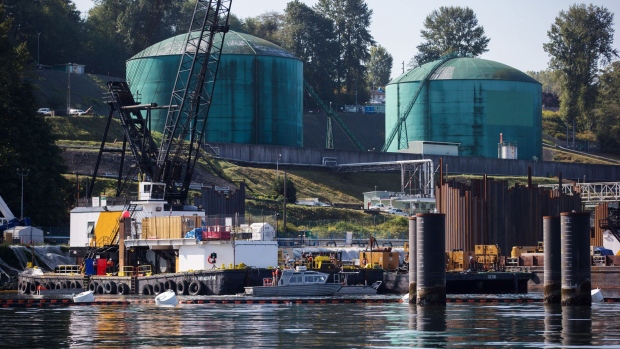Mar 10, 2023
Trans Mountain Oil Pipeline Cost Balloons 44% Months Before Start Up
, Bloomberg News

(Bloomberg) -- The cost of Canada’s Trans Mountain pipeline expansion’s has risen 44% just months before the conduit goes into operation delivering Alberta crude to the Pacific Coast.
The cost of expanding capacity to 890,000 barrels a day is now pegged at C$30.9 billion ($22.3 billion) because of a range of factors including inflation, supply-chain challenges, floods in British Columbia, unexpected archaeological discoveries and challenging terrain, the company said in a release on Friday. Trans Mountain is in the process of securing external financing for the additional costs.
Trans Mountain warned that costs could increase again and said “the current cost estimate does not include reserves for extraordinary risks that can impact projects of this nature.”
The new pricetag marks just the latest cost increase for a project that initially was forecast to run around C$5.4 billion when Kinder Morgan Inc. first proposed it a decade ago.
The line has faced repeated delays and regulatory holdups since then. Canadian Prime Minister Justin Trudeau decided to nationalize the system in 2018, paying Kinder Morgan C$4.5 billion after the midstream company threatened to cancel the expansion amid fierce local opposition and rising costs. In June, Canada’s budget watchdog said the line would be a “net loss” for taxpayers after Trans Mountain warned that costs had jumped 70% to C$21.4 billion.
The new conduit, which essentially lays adjacent to the original Trans Mountain line, is 80% complete and expected to be in operation during the first quarter of 2024 after reaching mechanical completion by year end, the operator said Friday. That’s a delay from last year when the line was expected to reach mechanical completion in the third quarter.
The pipe will make it easier to export Canadian heavy crude to Asia compared with the current route that involves sending it to the US Gulf Coast for export by tanker.
(Adds construction delay in penultimate paragraph.)
©2023 Bloomberg L.P.






